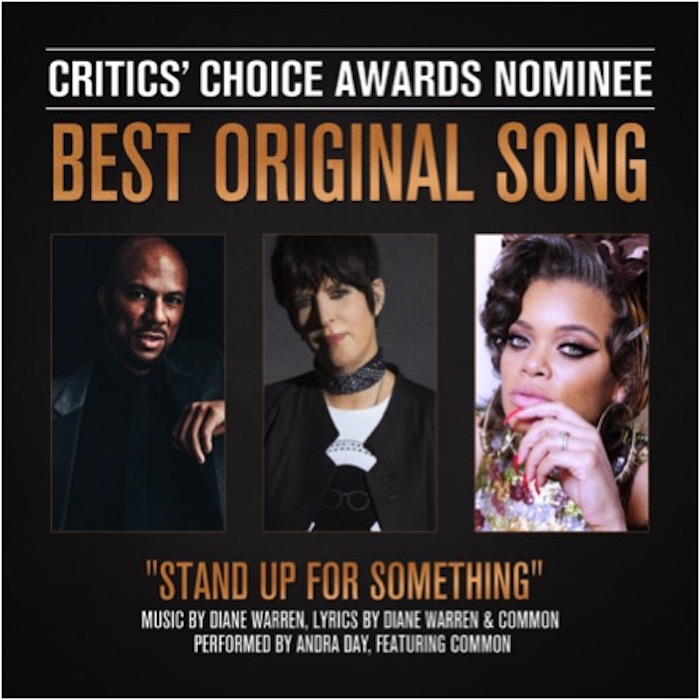by Pete Hammond
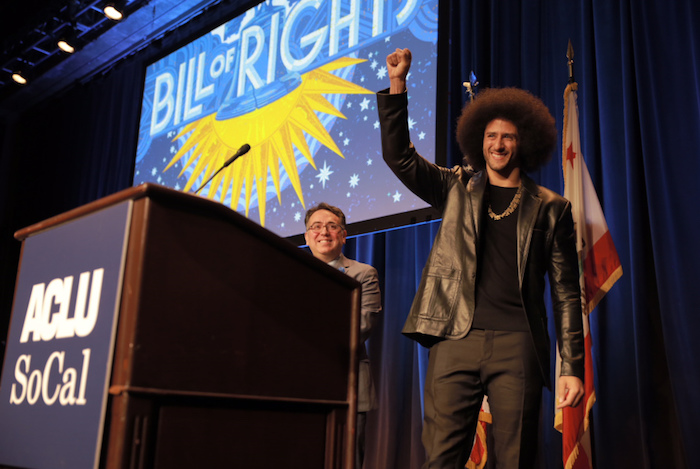
Presenter Billy Eichner put it succinctly when he took the stage at the ACLU of Southern California’s Bill Of Rights dinner last night. “In awards season in Hollywood, the Bill Of Rights Award is considered the precursor to the Golden Globe,” he joked. But he just may be on to something. This is a star-filled affair full of spirit and activism in the age of Trump, whose presence could be felt even if it was a room he would never dare step into. It also wasn’t a bad place to be seen if you also happen to have a movie or TV show in the hunt (among those I spoke with were Detroit’s Will Poulter and Crown Height’s Nnamdi Asomudha who had just been nominated for Indie Spirit and Image awards).
But much more importantly it felt like an energizing evening that was really about something much greater than any trinket Hollywood could hand out. And on a lively and highly political night that featured awards for Jane Fonda, Judd Apatow, Viola Davis, Reginald Hudlin, Gina Rodriguez and Dolores Huerta, it was the surprise unannounced appearance of former San Francisco 49ers Colin Kaepernick who brought the house down at the Beverly Wilshire Hotel.
With organizers saying his appearance had to be kept under wraps due to death threats and other security concerns, Kaepernick’s arrival onstage had the ambiance of a rock star being welcomed. With nary a Trump supporter to be found, he was greeted as the local hero for his controversial stand of taking a knee during the national anthem before NFL games, which pissed off a President and started a movement and led to many other players following suit.
After a raucous standing ovation upon receiving the organization Eason Monroe Courageous Advocate Award, Kaepernick seemed to be in his element. “We all have the obligation no matter the risk, and regardless of reward, to stand up for our fellow men and women who are being oppressed with the understanding that human rights cannot be compromised, ” he said, sounding every bit like he might be thinking about running for office someday.

ACLU SoCal Executive Director Hector Villagra, who earlier in the evening had noted the ACLU has launched 56 lawsuits to date against Trump Administration activities, introduced Kaepernick by saying, “He took a stand knowing some would criticize him, and he has been viciously and unfairly criticized. He has been called a traitor because too many people in this country confuse dissent for disloyalty.” After the presentation at the dinner break, Kaepernick was literally mobbed by well-heeled fans trying to take selfies with him. Among those lining up for the chance was departing Open Road chief Tom Ortenberg, a longtime ALCU supporter and awardee.
In addition to Kaepernick, there were presentations before the dinner break of the Bill Of Rights Award to a emotional Rodriguez; a hilarious Apatow; and a riveting and compelling Davis, who cited Martin Luther King Jr’s inspiring “mountaintop” speech, given the day before he was assassinated in 1968 was a particular inspiration for her. She recounted stories of growing up so poor that her family was living with rats running through their apartment. She said that whenever she complains about feeling tired after an 18-hour shooting day, or taking for granted winning yet another award, she realizes there is a much different definition for success. “I have two mottos for 2017, and they are ‘I am doing the best that I can, and ‘I am going to leave it all on the floor’.”
Rodriguez was tearful in detailing what the ACLU recognition meant to her as a Latino representative. “For those of us who make our living in Hollywood, the images that affect our fellow humans are our responsibility. So I accept this award and in doing so accept my responsibility to present a positive image to all those who look to me for inspiration. I will never stop trying to make this country a place where people of all races and ethnicities can feel accepted,” she said.
As for Apatow, he wasted no time in wishing the worst for Trump. “Do you feel weird? We so want there to be a pee tape,” he said, in reference to the infamous dossier rumored to detail incriminating sexual activity on Trump’s part when he was in Russia for the 2013 Miss Universe Pageant.
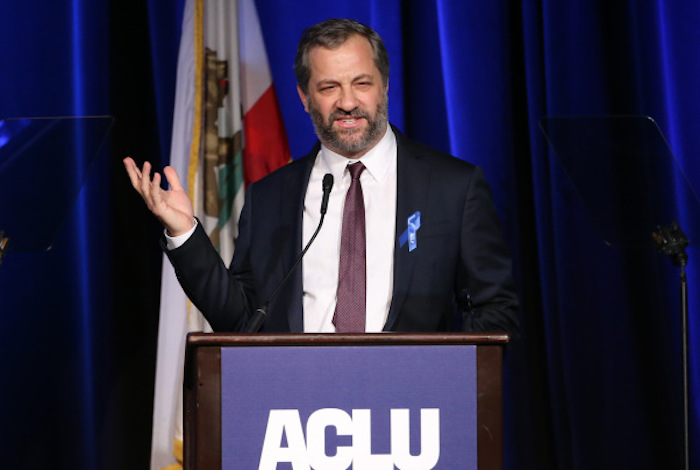
Mandatory Credit: Photo by David Buchan/Variety/REX/Shutterstock (9254974bb)
Judd Apatow
ACLU SoCal’s Annual Bill of Rights Dinner, Inside, Los Angeles, USA – 03 Dec 2017
Apatow also made observations about the wave of sexual harassment scandals hitting Hollywood since the Harvey Weinstein story broke. “I don’t understand all the masturbating that’s happening out there. I don’t get the idea of masturbating in front of other people. Isn’t the point of masturbating is that you’re alone? Nobody is judging you. Why do you need someone else there? It’s such a lack of imagination,” said to huge laughs from the crowd. “I was so happy when Charlie Rose and Matt Lauer got caught, I said ‘Thank God. Not another Jew’ “. Shortly after his appearance and acceptance speech, Apatow returned to the stage and pledged $50,000 in honor of his upcoming 50th birthday this week. It was matched later in the evening by Participant’s David Linde on behalf of Jeff Skoll and his company.
Producer-director Reginald Hudlin also received a Bill Of Rights Award after a rousing performance by Common and Andra Day of “Stand Up For Something,” the anthem from Hudlin’s current directorial achievement Marshall; the song was written by Diane Warren and is getting lots of Oscar buzz. Hudlin did a shout-out to Warren, who was sitting in the audience next to actress Frances Fisher, with both wearing #StandUpForSomething shirts.
Legendary United Farm Workers of America activist Dolores Huerta, herself the subject of Dolores, an Oscar-hopeful documentary this year, received a standing ovation upon receiving the Lifetime Advocate For Justice Award and led the audience in a spirited chant of “We’ve Got The Power! People Power!”
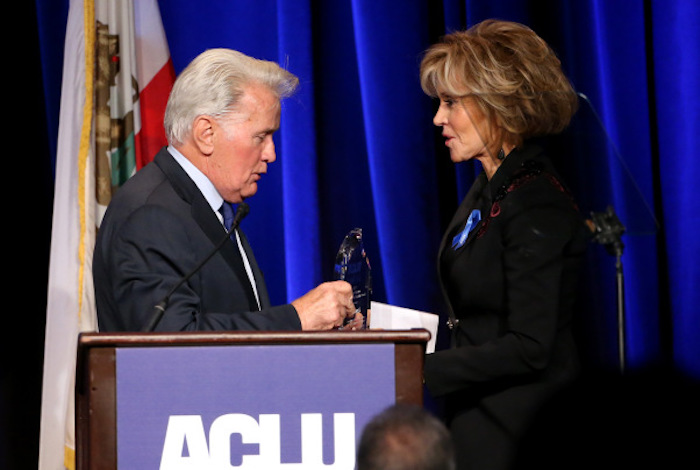
Mandatory Credit: Photo by David Buchan/Variety/REX/Shutterstock (9254974eq)
Martin Sheen and Jane Fonda
ACLU SoCal’s Annual Bill of Rights Dinner, Inside, Los Angeles, USA – 03 Dec 2017
Fonda was last to come up after being introduced by her Grace And Frankie co-star Martin Sheen, who said of the star-activist, “One heart with courage is a majority.” She recounted how the ACLU has been with her all her life. “So has the FBI,” she laughed. “After this election I felt like I had been hit by a truck, but when in doubt become an activist.” Fonda received the Ramona Ripston Liberty, Justice and Equality Award and quoted a line from poet Pablo Neruda to describe the determination and confidence she still has after nearly 50 years of social work and protest. “They can cut all the flowers but they can’t hold back the Spring”.

My mom and her dear friend Annette May with Colin Kaepernick.

Me, Anette May, Maxine Waters and my mom.

Andra Day SLAYS “Stand Up For Something” with Common.
Comment
+ Permalink
By Tim Gray
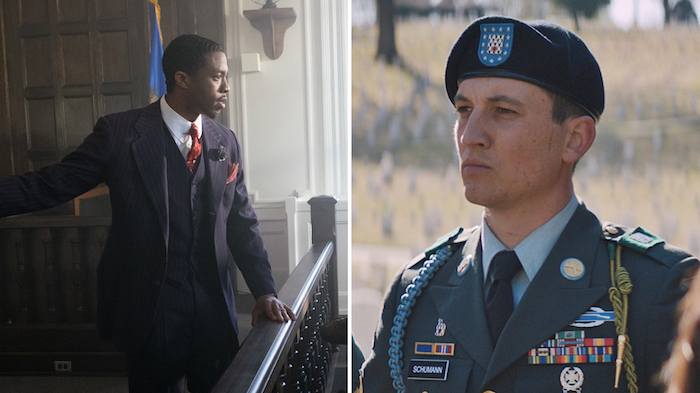
CREDIT: COURTESY OF OPEN ROAD FILMS/RELIANCE ENTERTAINMENT
Recent news about Hollywood has centered on jaw-dropping behavior (Harvey Weinstein, Kevin Spacey, et al.). So it’s nice to remember that there are decent people around, making movies that do good work.
Open Road’s “Marshall,” about Thurgood Marshall, and Universal-DreamWorks’ “Thank You for Your Service,” about real-life Iraq war vet Adam Schumann, are awards contenders, but they’re also going beyond that. Each film has done outreach to dozens of groups, to entertain and to help make a better world.
Producer Paula Wagner says if people are aware of Marshall, it’s because he won the landmark Brown v. Board of Education case and he was the first black justice on the Supreme Court. But the film takes place in 1940, early in his career before those milestones. “Nobody knew this case,” says Wagner, “but it touches on issues that we’re still dealing with,” including racism, anti-Semitism and a legal system that is often more hindrance than help.
The film landed with Tom Ortenberg and Open Road. Tang Media bought the company in August, just as “Marshall” was getting ready for release. Luckily, Donald Tang likes the movie and supported their plans for 100-plus screenings over several months. “Marshall” has been shown to church groups, law schools and to such companies as J.P. Morgan Chase and Apple to encourage conversations about corporate diversity.
A key target has been schools. One example: On Oct. 2, the movie was screened for 1,100 Southern California students. That was one day after the Las Vegas massacre, and emotions were high; the movie (directed by Reginald Hudlin, scripted by Jacob Koskoff & Michael Koskoff) helped the students focus their thoughts and feelings and started conversations about positive action. “It was one of the most moving experiences of my life,” Wagner says.
Similarly, “Thank You for Your Service” has stirred up emotions and gratitude at more than 50 screenings for veterans, their families and lawmakers.
Jason Hall, writer-director of “Thank You,” learned a lot about post-war experiences when he wrote the 2014 “American Sniper,” directed by Clint Eastwood. So for the new film, about the hurdles that vets face when they return home, he reached out to vets to set up screenings before the Oct. 27 opening.
Hall knew the film would stir emotions, “but their reaction wasn’t what I anticipated,” he says. “When you get a lot of them in a room, it became a shared communal experience.”
A recent screening on the Universal lot confirmed this, with animated vets remaining long afterwards to talk with Hall and discuss the film with each other. War veterans often have trouble conveying their experiences, both in battle and in the return home — and they don’t want people to worry.
“This movie does their talking for them. One veteran said, ‘You told our story; this experience is behind a wall that nobody else knows about.’”
Another key screening was for U.S. Secretary of Veteran Affairs David Shulkin and his team. The film’s depiction of VA hospitals in 2008 isn’t flattering; after the screening, VA workers vowed to use the film to get improved conditions and better funding.
The film will be shown next week for the Congressional Veterans Caucus in D.C. The co-chairman of that group is Rep. Mike Thompson (D-Calif.), a Vietnam vet who’s been working to secure better care for veterans with TBI and PTSD. He believes the film can personalize those struggles better than any words can.
These movies are not alone. With “Wind River,” for example, Acacia Entertainment has severed ties with the Weinstein Co. and any profits formerly earmarked for TWC will now go to the National Indigenous Women’s Resource Center. Open Road’s “The Promise” and its companion documentary “Intent to Destroy” were made as pet projects of Kirk Kerkorian, with all producer proceeds going toward the goal of raising awareness of the Armenian genocide.
Yes, people in Hollywood can be vile. But there are others who are working to make things better.
Comment
+ Permalink
Published Dec 6, 2017 By Dominic Griffin
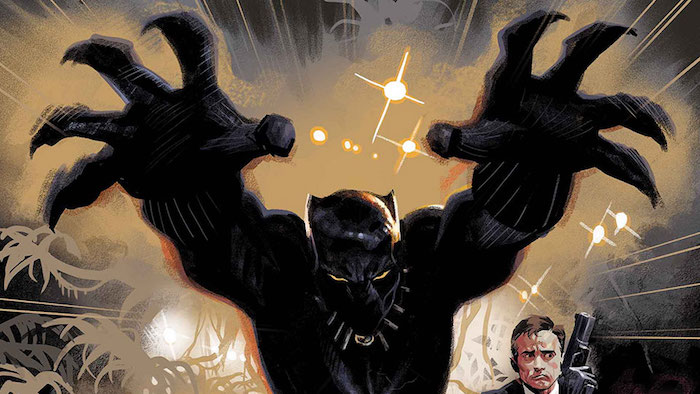
Three legendary writers book return trips to Wakanda!
With writer Ta-Nehesi Coates doing stellar work on the current BLACK PANTHER series and T’Challa making his solo film debut in February, three of the most iconic writers to ever pen stories for Wakanda return to the hero they helped make a household name; in February 18’s BLACK PANTHER ANNUAL #1, three distinct eras of the Panther will be revisited.
Don McGregor, the foundation-building scribe behind stories like “Panther’s Rage,” teams up with artist Daniel Acuna for a tale that takes King T’Challa out of Wakanda and onto the streets of New York for a gripping mission. Then, former BLACK PANTHER writer Christopher Priest will be joined by artist Mike Perkins for a story starring friend of Wakanda Everett K. Ross. And last but not least, the man behind “Who is The Black Panther?” and the director the recent film “Marshall”—starring the MCU’s T’Challa himself, Chadwick Boseman—will reunite with artist Ken Lashley for a sequel of sorts to their classic, “Black To The Future!”
We reached out to each of these legends to pick their brains about coming to a character they left such indelible marks on.
Marvel.com: What excited you most about returning to Black Panther?
Reginald Hudlin: When I was told that the book would feature me, Christopher Priest, and Don McGregor each doing Black Panther stories, it just felt historic. I knew I had to be a part of it.
Christopher Priest: Nothing. Seriously, nothing at all. It was terrifying.
My original run, especially the Marvel Knights installments, have finally found an audience. When we were actually doing the book, we literally couldn’t give copies away. There was enormous sales resistance and a lot of literal hate—and threats—from fans outraged that we gave Panther an iPhone. Seriously; there was this anti-tech backlash, “purists” who, from what I could tell, were confusing Black Panther with Tarzan. Panther is not Tarzan.
So, in those days, I’d spend a lot of energy engaging these fans and trying to please, please, sir, get them to go read FANTASTIC FOUR #52 and learn who Panther really is rather than who so many fans apparently believed he was—some kind of caveman or maybe Ka-Zar. He’s not Ka-Zar. He is ruler of one of the most technologically advanced societies in the world. Yes, dude, he can use an iPhone.
Don McGregor: It was excitement I felt when [editor] Wil Moss first approached me about coming back to write the Panther after being away from T’Challa for decades. I loved writing him, and I spent years with T’Challa’s voice in my head, trying to “hear” not only him, but all the characters in Wakanda around him.
I actually wrote that I was of the mind not to do it up on my Facebook page. I did not want to disappoint the readers who held such love for these characters, and how much, over the years, these stories had meant to them. The worst fear the storyteller can have, I suppose, is that you come back with a short piece and the reaction is “Man, Don had it back then; he should have left it alone!” But, when I wrote about it in the social media so many people responded that they wanted me to do it, I began to re-appraise accepting while I was visiting my daughter in California.
Marvel.com: How do you feel about the character’s growing pop cultural profile, with his appearance in “Captain America: Civil War” and now his own upcoming film?
Don McGregor: I think it’s terrific! The Panther has always been an important super hero in opening up the comics medium to the different kinds of characters and stories that can be told. I spent years of my life with him, so there becomes an intimacy of daily contact with each other, of staying open to what you can do as you continue to write the next issue. You often spend more time with the title characters of your series than you do with many of the people you know. It becomes a part of you, facing the next page, the next panel, trying to get it as right as you can in the moment you are creating it.
I thought Chadwick Boseman [brought] the right combination of grace and momentum and solemnity and strength to The Black Panther that was always the way I saw him. I am so glad [Marvel staffer] Peter Charpentier made it possible for me to meet with Chadwick during the San Diego Comic-Con this last summer.
Christopher Priest: Well, I certainly think it’s great. Chadwick Boseman’s end-of-innocence portrayal of a young T’Challa elevated the game for African—and African American—super heroes.
Reginald Hudlin: I remember all the Black Panther scripts that had been developed over the years. Almost all of them horrible. There were drafts where he grew up in housing projects in America with no idea of his royal heritage. Just ghastly perversions of the original concept.
So, when then-Executive Editor Axel Alonso and I sat down to talk about what was originally conceived to be a [limited series], I wanted to tell the story right. I didn’t know if there would ever be a movie, but I wanted to create a document that would tell fans who he was and be a blueprint for what a movie should be. I haven’t seen the film, but looking at how Klaw is portrayed and the inclusion of characters I created like Shuri, it looks like that is the case.
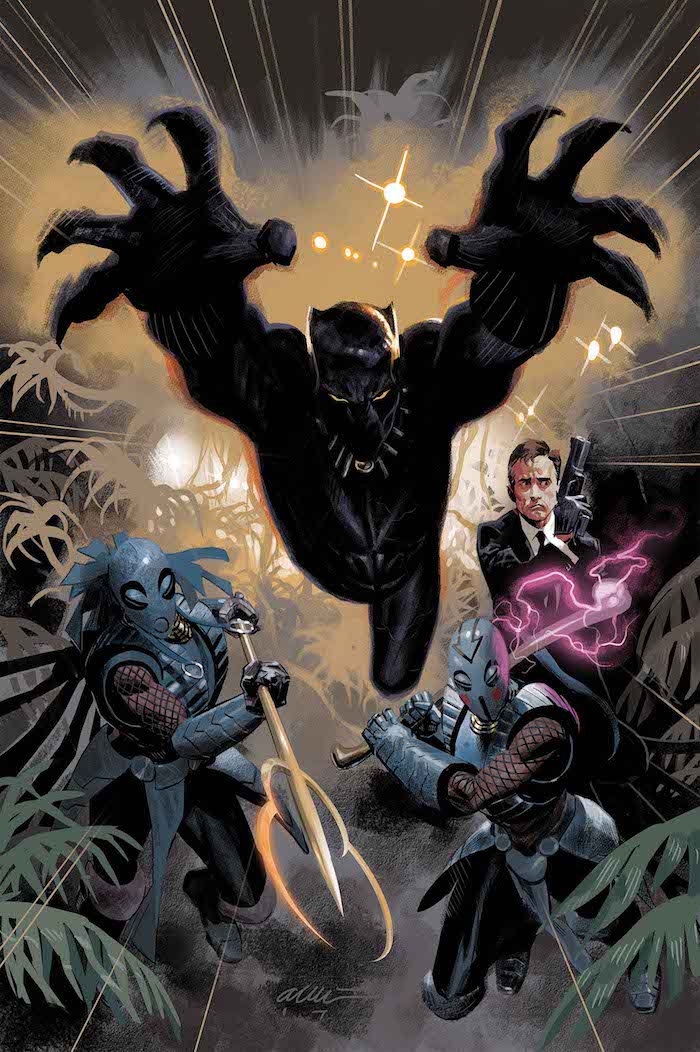
Marvel.com: Are there differences to how you approach the character now versus your original run on the book?
Don McGregor: Surely. You don’t have to do months of research to write a 12 page story as compared with a nearly 200 page graphic novel like “Panther’s Rage.” Back when I was first given the Panther to write there were multiple decisions that I had to make before I wrote one finished page. I not only read the comics; I had to research everything that would create the intricate details of Wakanda. Jack [Kirby] and Stan [Lee] had established it, but it was more a concept in those early stories, since they had a lot of characters with the Fantastic Four to interact with the Panther and whatever super villain they were fighting.
It was during those initial weeks that I discovered not one story had ever had anything to do with
Ramonda, the Panther’s mother, and I decided then that I would not mention her during “Panther’s Rage,” that this would be one big complete story, and then I would do a story dealing with South Africa and Apartheid. This would become “Panther’s Quest,” a story of a son, T’Challa, searching for his mother in an oppressive, racist regime, and how difficult such a place could make on the emotional turmoil of a son searching for a mother he has lost since childhood, a human theme I hoped everyone could relate to, and care about. As you can see, I was already concerned about where T’Challa’s life would go after “Panther’s Rage,” and before I wrote Book One of that series, I needed to know I had somewhere to go as a writer that would challenge me, but also make sure I was not writing the same story issue after issue.
Christopher Priest: Well, yes, I suppose. When I was writing the character 20 years ago, the mission was simpler: this is a story about a guy you think you know but you’ve, in fact, got him all wrong. Skip ahead 20 years, and now everybody is in on the joke. Reader expectation is different. Marvel Knights readers expected an overly serious homily on African culture, so we played against those expectations. Today’s audience already knows T’Challa is a capable—and deadly—adversary and technological genius, so I can’t write those “I can’t believe he took out Mephisto with one punch!” stories because, today’s audience knows he can.
Reginald Hudlin: Some fans on my web site asked me what story I would write if I ever came back to the character. There are a few I have in mind, but my favorite is a big epic story called World War Wakanda. It would be one of the big companywide crossovers. I only had six pages to tell my story, so I did an epilogue where you get glimpses of the result of the story It also functions as a follow up to the “Black to The Future” story I wrote for the very first BLACK PANTHER ANNUAL.
Marvel.com: What do you think makes Black Panther such an iconic figure?
Don McGregor: I suspect many people love the idea of a character who can move with such power and grace and [certainty], and look absolutely terrific doing so! But, I have the feeling, also, for many people that they admire and want a leader who truly does want to represent as many of his people as he can, and doesn’t merely luxuriate in his power and abilities. I suspect we wish there were politicians that acted as honorably and with concern about all the people in their land.
Reginald Hudlin: He’s the African equivalent of Captain America. In the same way Cap embodies all that is good about America, The Panther symbolizes all that is great about Africa.
Christopher Priest: He’s the black guy. C’mon, let’s be honest. He’s the black guy. And he’s not angry, he doesn’t use slang or “Ebonics,” he pulls his pants up, he keeps his word. Black Panther shames us—all of us—by his nobility. He may well be the single most noble guy on Earth. Do your best. Keep your word. It’s all anyone can ask of you.
T’Challa’s, like, the last noble man on earth. I am by no means anywhere near that noble, but I aspire to be well, if not good, at least as good as I personally can manage. That’s the best any of us can do. Dude: be as good as you personally can manage. Eat your vegetables. Do your best. Keep your word.
Don’t miss BLACK PANTHER ANNUAL #1, from Don McGregor, Christopher Priest, Reginald Hudlin, and their artistic collaborators, on February 18!
Comment
+ Permalink









